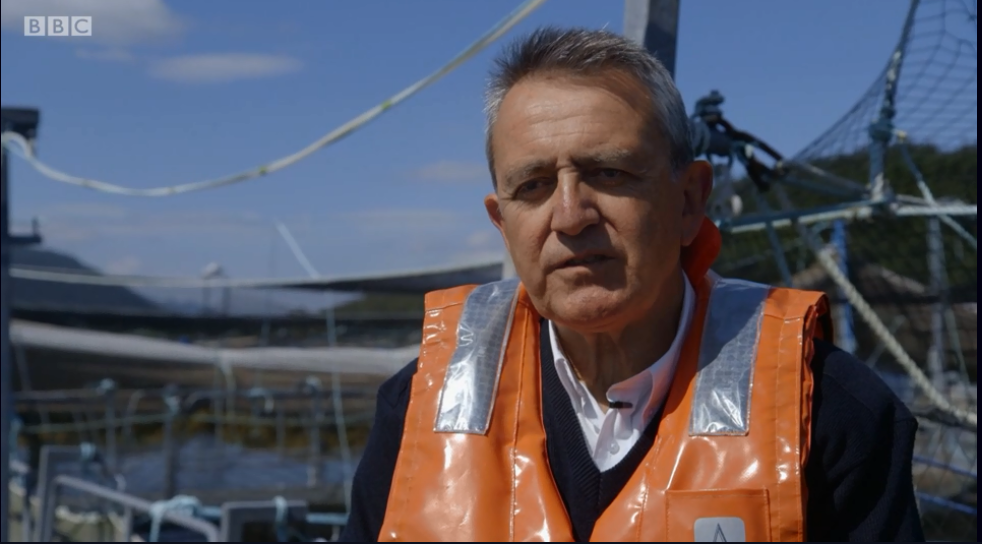Salmon star in BBC special

A LEADING salmon farmer said the industry in the future would need to ‘think a little bit differently’ if it wants to produce more fish.
Interviewed for a special BBC Scotland documentary about the impact of farmed salmon on wild stocks, Steve Bracken, who worked at Marine Harvest for 41 years until his retirement in the summer, also said tighter regulation of the industry would be welcomed.
The hour-long programme, ‘Landward: Saving our Salmon’, which aired on BBC2 last night, featured anglers, who spoke about the decline of salmon and trout numbers, and anti-salmon farming campaigners, who want to shut down the industry, as well as several fish farmers.
Bracken described the advantages of the Marine Harvest ‘Egg’ concept, currently being developed in Norway – a container that will sit in the sea, 44m high and 33m wide, holding about 1,000 tonnes of fish.
‘The idea is we’ll pump water up from below, so well out of the lice layer if you like,’ said Bracken. ‘Any waste will be taken out and not deposited in the sea.
‘It’s concepts like that that are very, very exciting and that’s just one of many that are being looked at, but I think really that is the future.’
Anglers blame salmon farms on the west coast of Scotland for the drop in wild catches, but other factors, such as warming sea temperatures and greater predation by bigger pelagic stocks are thought to play a part, although the Landward programme did not explore these issues.
The documentary makers did talk to Jamie McGrigor, former MSP and now an Argyll councillor, who has a share in a fishing syndicate with three small beats on the River Awe.
‘Twenty years ago or even 10 years ago we’d have thought that 2,700 fish through the dam was the norm; last year, we made 480 – the position is drastic,’ he said.
‘If the fish don’t come back, it’s a barometer of something going wrong in our environment.’
One of the criticisms of the industry made during the programme was that its Code of Good Practice is largely voluntary, but SEPA (the Scottish Environment Protection Agency) has said it is strengthening environmental regulation, with enhanced monitoring, a new approach to the siting of farms, and controlling the use of medicines.
Bracken told Landward that Marine Harvest is open to more mandatory regulation.
‘I think it’s absolutely vital that the regulation is looked at because it’s fit for purpose just now, but taking the tonnage up and up, we need to look very, very carefully where we’re going to be farming those fish.
‘And so there’s bound to be a change in regulation and we’re not against that. In fact, we would probably welcome it to show everybody that, yes, we are being properly regulated.’
The film included footage of Cooke Aquaculture’s farming operations in Yell and Unst, on Shetland, where the salmon sector employs one tenth of the population.
And the role of cleaner fish in controlling sea lice was investigated, from the point of view of a farmer (Loch Duart) and a wrasse fisherman.
Brian Smith, a creel fisherman from Skye, who supplies ballan wrasse to salmon farmers, said ‘nobody disliked salmon farms more than I did’ 30 years ago.
The fish back then were ‘weak, insipid’, he said, but when he first saw a modern salmon farm a couple of years ago, he was ‘gobsmacked’.
‘If I had seen any one of those fish that was leaping around inside that cage on the river I would immediately have said ‘wild’.
‘The overall look of the fish was exactly like I’m wanting to see in freshwater when I’ve got a fly rod in my hand.
‘The industry has moved on in the 30 odd years since I first saw it. It’s grown up; yes, there are still problems with disease on some farms. Now, is that bad management, bad practice or just sheer bad luck?
‘In 2000, there was an outbreak of foot and mouth that was all over the country that led to the deaths of millions of sheep and cattle. Did anyone scream for the closing down of sheep and cattle farming purely and simply because of one disease outbreak?
‘So why do they want the entire fish farm industry shut down because one farm has an outbreak of disease?’
He also said claims that ballan wrasse stocks were being wiped out because of fish farmers were ‘utter nonsense’ because no studies have been done on stock levels. Fishermen caught wrasse sustainably by leaving the breeding stock.
Angler and anti-salmon farming activist Corin Smith raised concerns about intensive farming on Scotland’s west coast.
‘The level of intensity is beyond the limits of credibility to suggest that wouldn’t have an enormous impact on the environment that it’s in,’ he told the programme.
However, it is estimated that salmon farming uses less than 0.02 per cent of Scotland’s available coastline, compared to the approximately 80 per cent of Scotland’s land mass that is used for agricultural production.
Bracken said that at Marine Harvest’s Loch Leven farm, stocking density was 15kg per cubic metre, which means one and a half per cent fish and 98.5 per cent water.
Landward: Saving our Salmon is available on BBC iplayer https://www.bbc.co.uk/iplayer/episode/b0bp15s1/landward-20182019-25-saving-our-salmon
Picture: Steve Bracken at Marine Harvest\’s Loch Leven site (photo: BBC)

